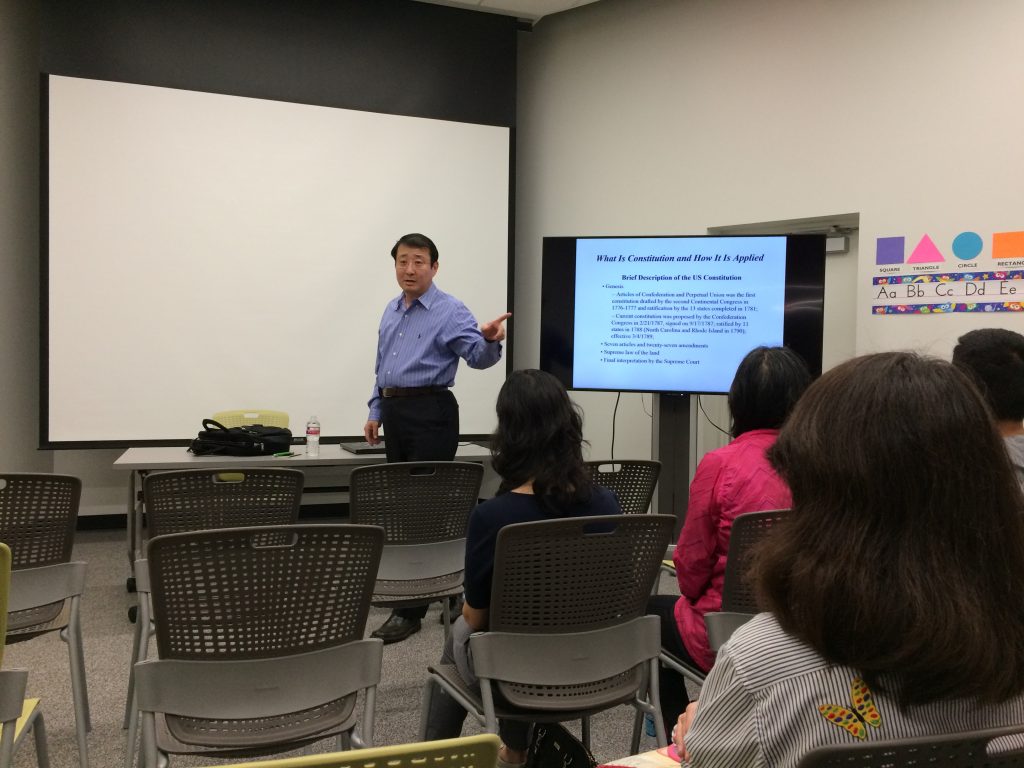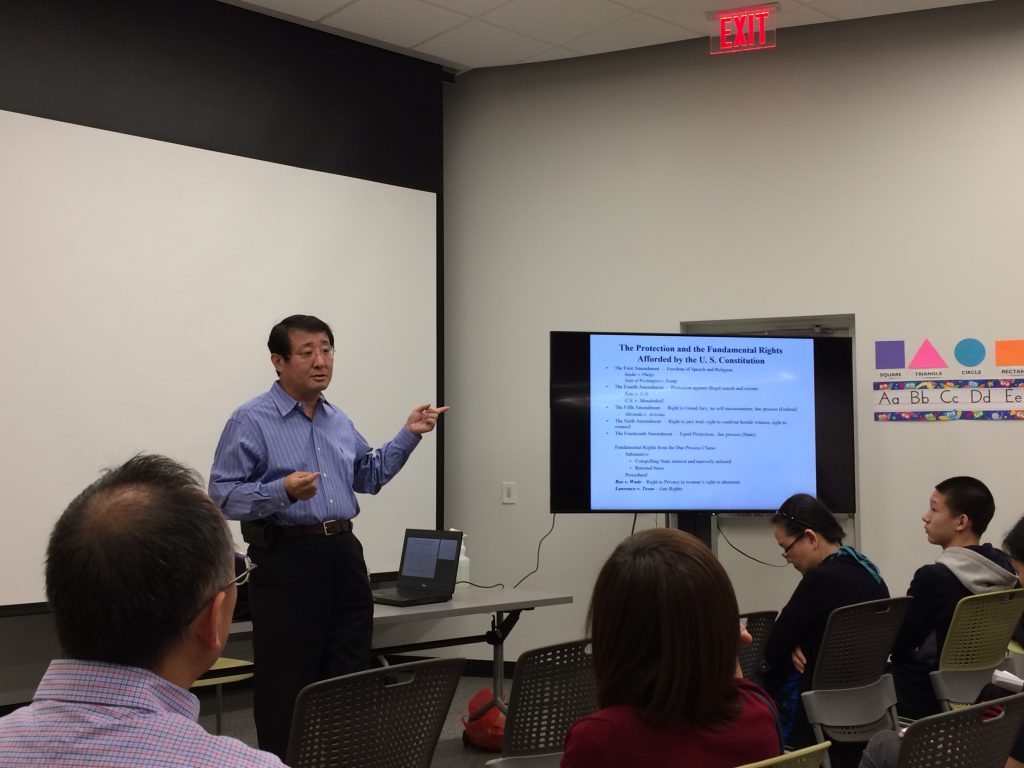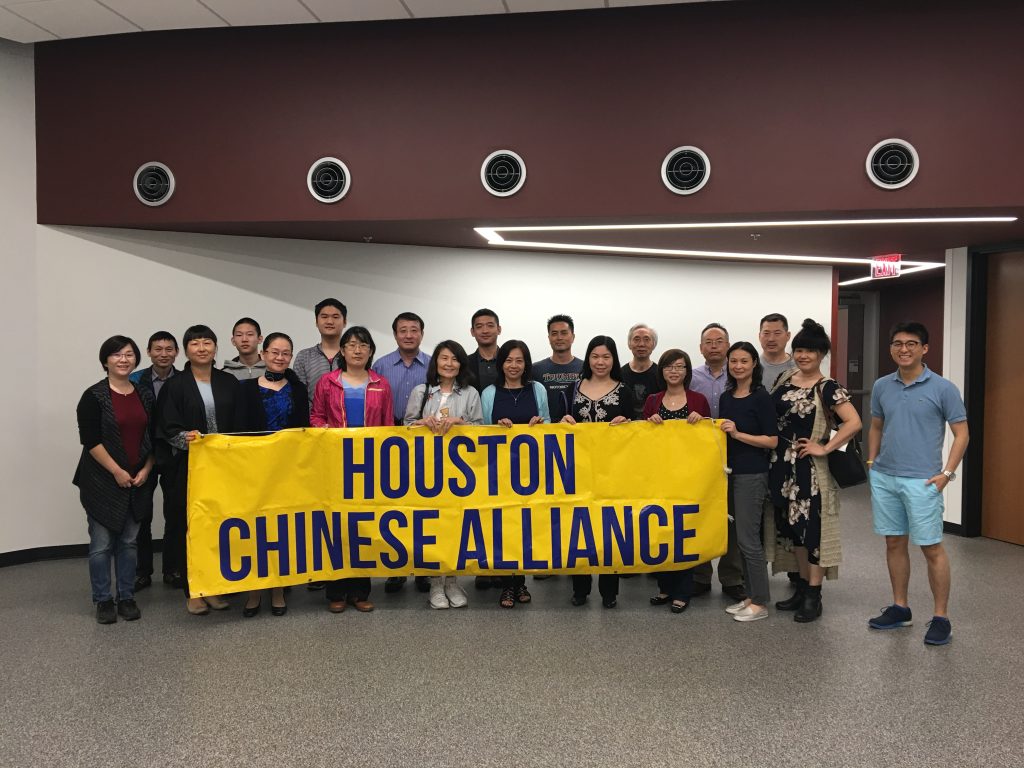March 18, 2017. HCA hosted a seminar on U.S. Constitution in the Jungman Neighborhood Library. Mr. David Cao, Senior Counsel, Office of Chief Counsel for IRS, discussed the origin and the fundamental goal of the Constitution, the general election system, as well as appropriate ways to interact with law enforcement personnel and protect ourselves using laws.
The Houston Chinese Alliance (HCA) successfully gave a lecture on the U.S. Constitution at the Jungman Neighborhood Library. Mr. David Cao, Senior Counsel, Office of Chief Counsel for IRS in Houston, and former President of HCA, focused on the Bill of Rights, with classic case law as the core, presented a very interesting lecture to the audience.
The Formation of the U.S. Constitution was a miracle
Since the United States was originally formed by 13 independent states, the early United States was like a “United Nations” of 13 members. In the eyes of the American people, the government is a necessary evil, so it must be confined to one framework, which is the Constitution of the United States. The purpose of the Constitution is to protect individual and limit the power of the government. The U.S. Constitution created a system of separation of three powers of the government. The parliament enacts the legislation; the court interprets the laws and the executive government executes the laws. Final interpretation of the Constitution resides with the U.S. Supreme Court.

The President of United States
The election of the President of the United States is conducted by a system of Electoral College. Registered voter cast ballots for members of the U.S. Electoral College, known as electors. These electors in turn cash direct votes, known as the electoral votes for President. The Electoral College and its procedures are established by the U.S. Constitution. The purpose of the Electoral College system is to balance the interest of the big states and the small states and to prevent a few big states with large voter base from jeopardizing the interest of the other states.
The U.S. Constitution Aims to protect Human Rights and Restrict Government
The jurisprudential basis of the spirit of affirmative action is from the fourteen amendment to the U.S. Constitution, while the specific boundaries of the law are established by case law. One of the classic case is the 1986 “Yihe v. Hopkins case”. Yi He, the owner of a Chinese laundromat, violated the San Francisco municipal ordinance, but because of the apparent discrimination in the administration of justice by the San Francisco municipal government, the Federal Supreme Court ruled that the San Francisco City Council order was unconstitutional, and ultimately handed the victory to Yi He. In particular, the protection provided for in the U.S. Constitution was “person” instead of “American Citizen”. If that were not the case, Yi He and the non-American citizen would not have been able to rely on the law to protect their interests.
Another classic case is that in 1957, President Eisenhower sent 1,000 U.S. Army paratroopers from the 101st Airborne Division to assist 9 African American students to attend their school. The strong will of the federal government to defend the Constitution, reflects the protection of human rights in the Constitution, as well as the difference of power between the federal and the state government. These vivid precedents make the U.S. Constitution a true shield for the protection of human rights.

How to deal with law enforcement officials
The fourth, Fifth and Sixth Amendments to the Constitution give people the right to freedom from illegal searches, illegal detention, and freedom from self-incrimination. These articles are especially important to Chinese in the United States. It is important to know your rights and know when to say “no” when dealing with the law enforcement officials. The wise Founding Fathers of the United States understand that government is a “necessary evil”. When they created this evil; they created the Constitution for people’s protection. The audience frequently asked questions during the lecture. The atmosphere was serious and enthusiastic. During the question-answer session, Mr. Cao explained the importance of due process in the case of O.J. Simpson. Through the lecture, the audience deeply realized that the wisdom and concern for human rights that had prevailed in the Constitution of the United States for more than 200 years were still shining as ever.

